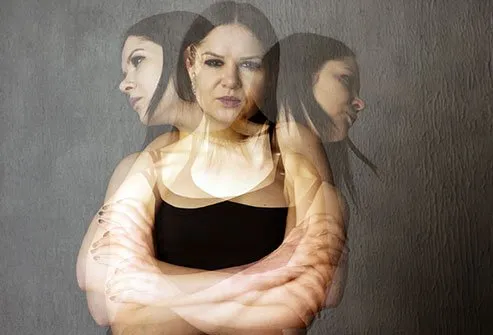- What Is
- Drug-Induced Psychosis
- Early Schizophrenia
- Schizophrenia Relapse
- Symptoms
- Can It Go Away?
- Treatment
- Outlook
-
Comments
-
**COMMENTSTAGLIST**
-
More
-
**OTHERTAGLIST**
What is drug-induced schizophrenia?

Drug-induced psychosis can last anywhere from a few hours or days to a few weeks. A schizophrenic episode triggered by drug use can take months to stabilize.
Schizophrenia is a serious mental illness that causes psychosis: a state where you have extremely muddled thinking and trouble knowing what’s real. It also causes a lack of interest in activities, a lack of emotions, poor self-care and hygiene, and withdrawal from people and the world.
Drug-induced schizophrenia occurs when you experience schizophrenia symptoms after using drugs: i.e., drug-induced psychosis.
Drug-induced psychosis is the more precise term because drugs can cause general psychosis, but they don't directly cause schizophrenia. You either have schizophrenia first or you're susceptible to it, and using drugs can trigger symptom onset. Drug use can also worsen your symptoms or trigger a relapse.
Drug-induced psychosis
Psychosis is a break from reality where you have hallucinations and delusions. You see and hear things that others don’t and believe things that aren’t true. Drug-induced psychosis happens when you take too much of a drug, mix different drugs together, or go through withdrawal.
The drugs lead to toxicity, which alters your brain chemicals and causes paranoia and a psychotic episode.
Substances that often cause drug-induced psychosis include:
- Alcohol
- Cannabis
- Amphetamines
- Opioids
- Sedatives
- Cocaine
- Psychedelics like LSD or ecstasy
Drug abuse triggers early schizophrenia
Experts don’t know exactly what causes schizophrenia. It’s likely a combination of genetics, trauma, and your environment, which affect your brain chemicals and structure. Studies show, though, that if you misuse mind-altering drugs, you have a higher risk of triggering schizophrenia. This is especially true if you’re susceptible to the condition and use drugs as a teenager.
Drug abuse triggers schizophrenia relapse
If you’re recovering from a schizophrenic episode and severe psychosis, using drugs and alcohol can also trigger a relapse. Alcohol and street drugs can make your schizophrenia symptoms seem better, but this relief is only temporary, and, over time, they will worsen your illness and symptoms.
What are the symptoms of drug-induced schizophrenia?
Symptoms of drug-induced psychosis usually come on slowly as you use more drugs more often. The longer you abuse substances and the more intense the abuse, the higher the risk of getting psychosis. Symptoms can vary by the drug.
Hallucinations
Some substances, like the hallucinogen LSD, cause you to see, hear, and feel things that don’t exist because you’re high. Substance-induced psychosis and hallucinations consist of more than being high, though, and can happen when you’re not using drugs. Symptoms are linked to taking large amounts of these drugs for a long time.
Symptoms include:
- Hearing voices, like someone narrating your actions, or someone telling you to hurt yourself
- Seeing people, shadows, or lights that aren’t there
- Hearing sounds, like music playing or footsteps following you
- Feeling bugs on your skin
- Smelling things that aren’t there
- Feeling like your body is floating or moving
Delusions
Delusions occur when you firmly believe something that’s not real. These are hallmarks of schizophrenia that can coincide with drug-induced psychosis.
Symptoms include:
- Self-important beliefs where you believe you’re famous or you’re the president of a country
- Religious delusions where you believe you are a revered spiritual figure
- Bizarre beliefs, including ideas that people are planting thoughts in your mind or that you can raise people from the dead
- Beliefs that explain your hallucinations, like believing that someone is stalking you because you hear voices
Paranoia
Paranoia is when you think or feel someone is trying to threaten or harm you when they’re not. It causes worry, stress, and fear. These thoughts are described as delusions or exaggerated suspicions. Drug toxicity often causes persecutory or paranoid delusions, but these also occur with schizophrenia, and drugs can make these symptoms worse.
Examples of common paranoid beliefs include suspicions that:
- Someone is trying to hurt you
- Other people are talking about you or excluding you
- The government is controlling you
- People are trying to steal your belongings

SLIDESHOW
What's Schizophrenia? Symptoms, Types, Causes, Treatment See SlideshowCan drug-induced schizophrenia go away?
You can recover from drug-induced psychosis. It usually goes away within a few days but may also last a few weeks. If it lasts longer than 4 weeks, your doctor will consider a diagnosis of schizophrenia. A severe schizophrenic episode can take 12 months to stabilize, and it never fully goes away.
Do not be discouraged, though. Most people with schizophrenia live a full and rewarding life with treatment and help.
However, if you use street drugs and alcohol, you will have periods of worsened symptoms and relapses.
How is drug-induced schizophrenia treated?
In most cases of drug-induced psychosis, all you need is a calm environment, time to recover, and sometimes medication. Your doctor will need to watch you closely and monitor any toxicity and withdrawal symptoms. If you have schizophrenia, long-term medication and addiction treatment are also important for your health.
Medication
If you need medication for drug-induced psychosis, your doctor will prescribe benzodiazepines or an antipsychotic. Once symptoms pass, you might not need any other treatment.
If you’re diagnosed with schizophrenia, however, you will need antipsychotic medication even after symptoms pass. Schizophrenia is a lifelong disorder, and medication helps control your symptoms so you can stay independent. If you have a severe relapse or episode, you might need to be hospitalized until you feel better.
Treatment for substance-use disorder
Sometimes, people with schizophrenia use street drugs or drink alcohol because you can get them easily, they’re affordable, and they temporarily make you feel better. These can trigger relapses, though, and make your schizophrenia worse over time.
It’s important to avoid using alcohol and drugs and to get treatment for substance use disorder. This might include hospital treatment, medication, or rehab and therapy.
Outlook
Drugs don’t cause schizophrenia, but they can trigger a relapse or early onset of the disease if you already have it. If you use drugs and alcohol, you have a high risk of making your schizophrenia worse. Talk to your doctor about managing substance misuse and schizophrenia.
Health News
American Addiction Centers: "Substance Induced Psychosis: Signs & Treatment Near Me."
American Journal of Psychiatry: "Substance-Induced Psychotic Disorders and Schizophrenia: Pathophysiological Insights and Clinical Implications."
Mayo Clinic: "Schizophrenia."
Merck Manual Professional Version: "Substance-/Medication-Induced Psychotic Disorder."
Mind: "What is paranoia?"
National Health Service: "Causes — Schizophrenia," "Hallucinations and hearing voices," "Living with — Schizophrenia," "Treatment — Schizophrenia," "Symptoms — Psychosis."
Pharmacy and Therapeutics: "Schizophrenia: Overview and Treatment Options."
Priory: "Drug Induced Psychosis: Causes, Symptoms and Treatment."
Schizophrenia Society of Canada: "Schizophrenia & Substance Use."
Top What Are the Signs of Drug-Induced Schizophrenia Related Articles

Abilify
Abilify is an antipsychotic medication used to treat psychoses such as schizophrenia, bipolar mania and mixed manic/depressive episodes, major depressive disorder in adults, irritability associated with autistic disorder, Tourette's disorder, agitation associated with schizophrenia or bipolar mania. This drug should not be taken by patients with certain diseases and health conditions.
Can Stress and Anxiety Cause Schizophrenia?
Stress is your body's way of responding to mental, physical, or emotional pressure and anxiety is your body's way of reacting to stressful situations. While stress is not a direct cause of schizophrenia, it can trigger an episode of schizophrenia in an already vulnerable person.
cariprazine
Cariprazine is an antipsychotic medication used in the treatment of schizophrenia, bipolar I disorder and major depressive disorder in adults. Common side effects of cariprazine include headache, drug-related movement disorders (extra-pyramidal symptoms), inability to stay still (akathisia), abnormal contraction of groups of muscles (dystonia), dizziness, insomnia, drowsiness (somnolence), anxiety, restlessness, agitation, constipation, abdominal pain, indigestion (dyspepsia), toothache, and others.
What Is the Difference Between Psychosis and Schizophrenia?
Learn the difference between psychosis and schizophrenia. Read more about these two conditions and how they can affect your mental and physical health.
Do Schizophrenics Feel Emotions?
Schizophrenia is a major mental illness that affects how the brain processes information. Research on schizophrenia and emotions has revealed that people with schizophrenia lack the ability to recognize and express emotion.
How Does Drug Use Cause Schizophrenia?
Schizophrenia is one of the most common mental illnesses. Although drug use does not cause schizophrenia, there is unassailable evidence that the two are closely related.
Is CBD Good for Schizophrenia?
Schizophrenia is a chronic psychotic disorder that affects a small portion of the world's population. There is some evidence that CBD might aid in the treatment of neurological conditions such as schizophrenia.
Is Tardive Dyskinesia Brain Damage?
Tardive dyskinesia is a movement disorder caused by certain kinds of medication, including some antipsychotics and antidepressants. Tardive dyskinesia is brain damage in the sense that it’s likely caused by permanent alterations to your brain's biochemistry.
quetiapine
Quetiapine is an antipsychotic drug prescribed to treat bipolar disorder and schizophrenia. Common side effects include dizziness, drowsiness, and weight gain. Possible serious and important side effects include seizures, stroke, priapism (prolonged erection), irregular pulse or blood pressure, rapid heart rate, and excessive sweating. Consult your doctor prior to taking this medication if pregnant or breastfeeding.
risperidone, Risperdal; Risperdal Consta, Risperdal M-TAB
Risperidone (Risperdal, Risperdal Consta, Risperdal M-TAB) is an atypical antipsychotic drug prescribed for treating bipolar mania, schizophrenia, stuttering, Tourette syndrome, autism in children and adolescents, and OCD (obsessive compulsive disorder). Side effects, drug interactions, warnings and precautions, and pregnancy safety should be reviewed prior to taking this medication.
Schizophrenia
Schizophrenia is a disabling brain disorder that may cause hallucinations and delusions and affect a person's ability to communicate and pay attention. Symptoms of psychosis appear in men in their late teens and early 20s and in women in their mid-20s to early 30s. With treatment involving the use of antipsychotic medications and psychosocial treatment, schizophrenia patients can lead rewarding and meaningful lives.
What's Schizophrenia? Symptoms, Types, Causes, Treatment
What is the definition of schizophrenia? What is paranoid schizophrenia? Read about schizophrenia types and learn about schizophrenia symptoms, signs, and treatment options.
Schizophrenia Quiz
Schizophrenia is a complex psychiatric disorder. Learn more about the challenges of mental illness with the Schizophrenia Quiz.
How Do I Talk to Someone With Schizoaffective Disorder?
Schizoaffective disorder is a mental health condition that causes schizophrenia symptoms like delusions, hallucinations, depression, and mania. Always try to be non-judgmental and supportive when communicating with people with schizoaffective disorder.
What Are the 5 Types of Schizophrenia?
Schizophrenia is a form of psychosis that can cause delusions and other behaviors that adversely affect your life. Learn more about schizophrenia and its symptoms.
What Are the Top 10 Signs of Schizophrenia?
Schizophrenia is a chronic mental health condition that affects how people think, feel, and act. The top 10 signs of schizophrenia include hallucinations, disorganized thinking, delusions, and other signs.
What Can Trigger Schizophrenia?
Schizophrenia usually shows its first signs in men in their late teens or early 20s and women in their early 20s and 30s. It’s rare before adolescence. Though the exact triggers and causes of schizophrenia aren’t known, several risk factors can contribute to schizophrenia, including genetics, brain chemistry and circuits, brain abnormalities, and environmental factors.